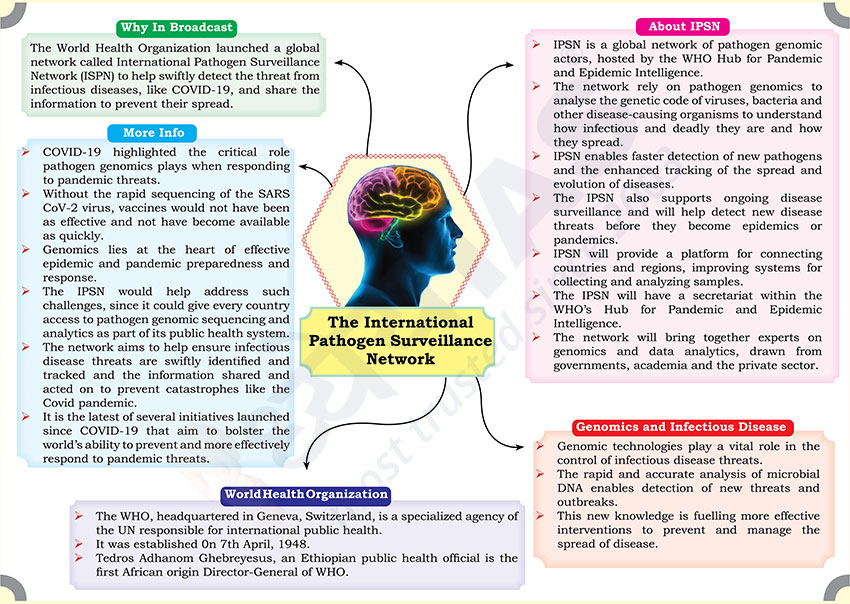Brain-booster
/
11 Jun 2023
Brain Booster for UPSC & State PCS Examination (Topic: The International Pathogen Surveillance Network)

Why in Broadcast?
- The World Health Organization launched a global network called
International Pathogen Surveillance Network (ISPN) to help swiftly detect
the threat from infectious diseases, like COVID-19, and share the
information to prevent their spread.
About IPSN
- IPSN is a global network of pathogen genomic actors, hosted by the WHO
Hub for Pandemic and Epidemic Intelligence.
- The network rely on pathogen genomics to analyse the genetic code of
viruses, bacteria and other disease-causing organisms to understand how
infectious and deadly they are and how they spread.
- IPSN enables faster detection of new pathogens and the enhanced tracking
of the spread and evolution of diseases.
- The IPSN also supports ongoing disease surveillance and will help detect
new disease threats before they become epidemics or pandemics.
- IPSN will provide a platform for connecting countries and regions,
improving systems for collecting and analyzing samples.
- The IPSN will have a secretariat within the WHO’s Hub for Pandemic and
Epidemic Intelligence.
- The network will bring together experts on genomics and data analytics,
drawn from governments, academia and the private sector.
Genomics and Infectious Disease
- Genomic technologies play a vital role in the control of infectious
disease threats.
- The rapid and accurate analysis of microbial DNA enables detection of
new threats and outbreaks.
- This new knowledge is fuelling more effective interventions to prevent
and manage the spread of disease.
World Health Organization
- The WHO, headquartered in Geneva, Switzerland, is a specialized agency
of the UN responsible for international public health.
- It was established 0n 7th April, 1948.
- Tedros Adhanom Ghebreyesus, an Ethiopian public health official is the
first African origin Director-General of WHO.
More Info
- COVID-19 highlighted the critical role pathogen genomics plays when
responding to pandemic threats.
- Without the rapid sequencing of the SARS CoV-2 virus, vaccines would not
have been as effective and not have become available as quickly.
- Genomics lies at the heart of effective epidemic and pandemic
preparedness and response.
- The IPSN would help address such challenges, since it could give every
country access to pathogen genomic sequencing and analytics as part of its
public health system.
- The network aims to help ensure infectious disease threats are swiftly
identified and tracked and the information shared and acted on to prevent
catastrophes like the Covid pandemic.
- It is the latest of several initiatives launched since COVID-19 that aim
to bolster the world’s ability to prevent and more effectively respond to
pandemic threats.







